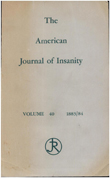Validity of a diagnosis of lifetime major depression obtained by personal interview versus family history
Abstract
OBJECTIVE: Diagnoses obtained by family history agree only modestly with those obtained through personal interview. If personal interview diagnoses are the "gold standard," these findings suggest that family history diagnoses have low validity. Here the authors take another perspective--to evaluate family history versus personal interview diagnoses of lifetime major depression by three independent validators. METHOD: In a large sample of female-female twin pairs and their parents (903 families) ascertained from a population-based twin register, all subjects were personally interviewed by using a modified Structured Clinical Interview for DMS-III-R. Family history diagnoses based on the Family History Research Diagnostic Criteria were obtained by questioning each participant about his or her relatives. By means of multiple regression, the powers of the personal interview and family history methods were compared to predict 1) future episodes of major depression in the twins, 2) neuroticism, and 3) familial aggregation of major depression. RESULTS: Agreement between diagnoses obtained by personal interview and family history was modest. After the presence or absence of a personal interview diagnosis of major depression was controlled for, a family history diagnosis of major depression significantly predicted future episodes of major depression, neuroticism (in five of six analyses), and familial aggregation of major depression (in four of six analyses). CONCLUSIONS: Although agreeing relatively poorly, diagnoses of lifetime major depression obtained by personal interview and family history both contained useful information about future episodes, personality, and familial liability to illness. A multimethod approach to assessment of psychiatric illness may maximize the validity of psychiatric diagnoses.
Access content
To read the fulltext, please use one of the options below to sign in or purchase access.- Personal login
- Institutional Login
- Sign in via OpenAthens
- Register for access
-
Please login/register if you wish to pair your device and check access availability.
Not a subscriber?
PsychiatryOnline subscription options offer access to the DSM-5 library, books, journals, CME, and patient resources. This all-in-one virtual library provides psychiatrists and mental health professionals with key resources for diagnosis, treatment, research, and professional development.
Need more help? PsychiatryOnline Customer Service may be reached by emailing [email protected] or by calling 800-368-5777 (in the U.S.) or 703-907-7322 (outside the U.S.).



